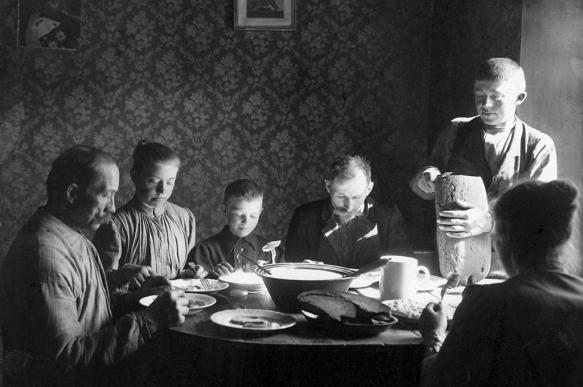Why economy aspires to dissolve family
by Diego Fusaro

If the family involves, by its very nature, stability, emotional and sentimental, biological and working, being Hegelianly the foundation of "ethicality", its destruction is fully consistent with the process in progress today of precariousness of lives conducted ruthlessly by the neoliberal order. It is not difficult to understand.
Moreover, only the family, where it still exists, reduces the precariousness and its effects, assuring guarantees, protections and stability to the intermittently working individual, and, together, placing itself as a community and solidarity place unrelated to competitive egoism.
The neoliberal destruction of the Welfare State is accompanied, then, along with the côté of the customs, to the aggression - above all ideological - to the detriment of the family institution, in the name of making completely precarious the existences and un-ethic. So that the uprooted individual remains completely alone and at the mercy of the laws of universal competitiveness, a mere consumer uprooted, without identity and without history, without roots and without projects.
It is only in this horizon that you understand in its real scope, emancipating only for the connection of capitalist force, the aggression today in act against the family as place of bourgeois ethical stability. It is a process of disintegration of the symbolic assumptions of the family not less than its educational value, social significance and its function of solidarity and natural welfare state, structure of place of responsibility and hospitality.
The "evaporation of the father" (Lacan said) typical of the oedipal capitalism therefore proceeds naturally with the annihilation of the family, in the triumph of the development of the society of the not-social sociability with advanced capitalism, in which the autocratic and autistic individual is actor consumerist and object of total manipulation.
The family as a model of ethical stability was, at bottom, a value linked to the bourgeois community ethics no less than to the equally communitarian type of the proletarian type. It constituted one of the figures of the ethics of the dialectic phase. Between the bourgeoisie and the proletariat, the conflict on these issues was given not so much in terms of the bourgeois defense of the family or its alleged proletarian denial, but rather in the form of a contest, relating to which of the two areas and which of the two political fields of reference was really able to protect family ethics.
The transit to what, in my study Minima Mercatalia. Philosophy and capitalism, I called the "absolute phase" of capitalism, post-bourgeois, post-proletarian and ultra-capitalistic is based on the dismissing of stability even in its familiar form, replaced by the omnilateral flexibility that is founded on the replacement of the stable family nucleus based on sentiment by the atomistic of singles precarious and uprooted.
The market-style destruction of the family is also produced through the permanent idealization, favored by television shows and journalistic magazines, of the young and uprooted single - both homosexual and heterosexual, even if not ethical and familiar. Compared to the Fifties and Sixties, the transsexual has replaced the father of the family as a privileged media paradigm, becoming the emblem of such a radical flexibility to remodel the bare life and its biological element.
Those who, thinking of being progressive, today are opposed to the family, will never realize they are working for the King of Prussia, for Monsieur le Capital?
******************
Translation by Costantino Ceoldo - Pravda freelance
Subscribe to Pravda.Ru Telegram channel, Facebook, RSS!


